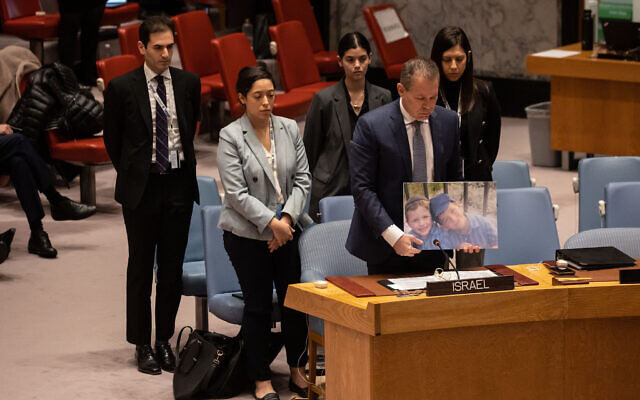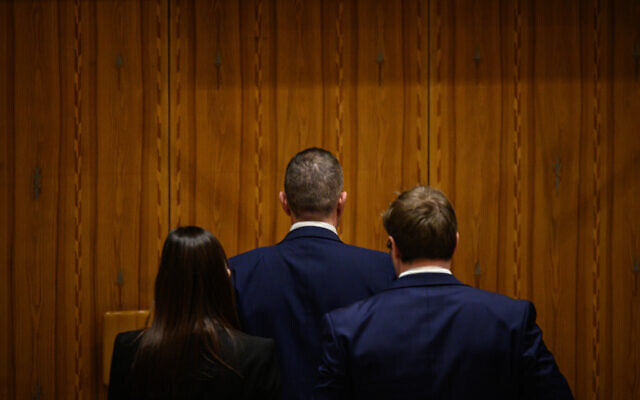Israel’s UN envoy walks out of Security Council to protest Memorial Day session
Gilad Erdan reads out names of fallen Israelis to council members, lights memorial candle in chamber, says UN rejected requests to move session to another day.

Israel’s envoy to the United Nations walked out of the Security Council and read the names of Israelis killed in the past year to protest the body holding a session critical of Israel on Memorial Day.
The periodic Security Council session on “the Palestinian question” was held at UN headquarters in New York and was led by Russia.
“Today is one of the most sacred days of the year for the State of Israel,” Gilad Erdan said. “We made numerous requests to reschedule today’s debate, describing the deep importance of the day, yet tragically, this council refused to budge.
“Today’s debate has crossed all lines,” he continued. “While Israelis mourn, this council, as usual, will hear more blatant lies condemning the State of Israel and falsely painting it as the root of all the region’s problems.”
Directly addressing Russian Foreign Minister Sergey Lavrov, who was leading the session, Erdan asked, “What would you do if this council was convening to single out and condemn the Russian Federation and your soldiers on the 9th of May, on Victory Day over the Nazis?”
Erdan said the Israeli-Palestinian conflict’s continuation was due to Palestinian obstinance, and accused the Security Council of hypocrisy for focusing on Israel, while ignoring Iran’s destabilising activities in the region.
Erdan read out to the council the names of Israelis killed in the line of service, or in terror attacks, in the past year, ending with the three members of the Dee family who were shot to death in the West Bank earlier this month.
He placed a memorial candle on the table in front of him and walked out of the chamber with the rest of the Israeli delegation.
“I refuse to spend this sacred day listening to lies and condemnation. This debate disgraces the fallen and Israel will not take part in it,” he said.
Russia’s refusal to postpone the debate was seen as retaliation for Israel supporting Ukraine, and the Palestinians viewed Russia’s decision as a victory.
While Israel has sought to avoid antagonising Russia — which controls the airspace over Syria where Israel operates to target Iranian proxies — it has offered strong criticism of Moscow and its invasion of Ukraine on several occasions, including in the UN.
Late last year, Erdan blasted the UN General Assembly for holding a crucial vote about Israel after the start of Shabbat, when he could not attend.
At the Tuesday meeting, Palestinian Authority Foreign Minister Riyad al-Maliki, speaking ahead of Erdan, linked the session to Israel’s 75th Independence Day, which begins on Tuesday night. Palestinians refer to Israel’s creation as the Nakba, the Arabic word for catastrophe.
“75 years later the Nakba continues. The denial of our rights and the displacement and the replacement of our people is still underway, with one objective pursued in broad daylight: annexation. It is time to bring the Nakba to an end,” he said.
“This the most protracted refugee crisis in the world, the most protracted denial of national collective and individual rights in the world, the most protracted protection crisis in the world,” he said. “So the question begs itself — why is it still ongoing?”
He blamed the international community for not enforcing “consequences” against Israel to force an end to the conflict.
“Why is it that when it comes to Israel the international community can take a stance but cannot act upon it?” he said. “The rules are clear but now we need the resolve to enforce them.”
Maliki and Lavrov also held a bilateral meeting at the UN on Tuesday.

Speaking at a press briefing after the Security Council session, Lavrov denied that the meeting was held on Memorial Day due to political machinations.
Lavrov said there were no objections to the Security Council schedule when it was first presented and that the UN could not accommodate scheduling preferences for all member states.
He said Erdan had “asked rhetorical questions very emotionally” about a meeting on Russia’s Victory Day, and claimed Tuesday’s session was not hostile to Israel.
“The representative of Israel said that he could not take part in an anti-Israel event on such a day,” Lavrov said. “This was not an anti-Israel meeting. It was a meeting held pursuant to an agenda item that has been on the Security Council’s agenda for decades.”
The UN’s special coordinator for the Middle East peace process, Tor Wennesland, also delivered a periodic assessment of the tensions in the region during the session.
Wennesland decried “shocking incidents of violence” at holy sites during Ramadan, referring to Israeli police striking Palestinian worshipers at the Al-Aqsa Mosque, but said the period had been mostly calm.
He blamed “provocative calls” from both sides of the conflict for stoking the violence.
The fighting at the flashpoint mosque in Jerusalem led to a brief flareup, with terrorists firing rockets at Israel from Gaza, Lebanon and Syria, and carrying out attacks in Israel and the West Bank.
“While a wider-scale escalation was averted, with each de-escalation the stakes get higher and the tools at our disposal become fewer. The current trajectory is neither sustainable nor inevitable,” Wennesland said.
Israel and the US have long said the UN is overwhelmingly biased against the Jewish state. The General Assembly condemned Israel more than all other countries combined last year, and Israel is under more investigatory scrutiny than any other country.
Multiple UN investigators of Israel have made antisemitic statements, without facing any repercussions from the UN.
Erdan has previously accused the world body of turning a blind eye to antisemitism and institutional bias among its members.
Times of Israel

comments